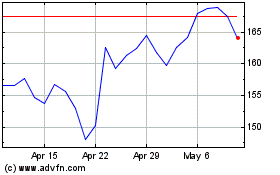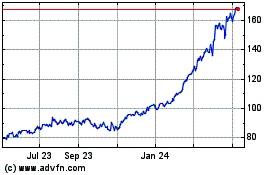Oil Gloom Hurts GE Results -- Update
April 22 2016 - 4:28PM
Dow Jones News
By Ted Mann
The global oil-market rout continued to weigh on General
Electric Co., which posted a quarterly decline in operating income
and orders for its core industrial businesses.
GE reported a 6.1% gain in revenue for the first three months of
2016, but profit declines in units making locomotives, power
turbines and oil-industry equipment weighed on overall results.
Chief Executive Jeff Immelt said the conglomerate's diversity
enabled it to withstand a "very challenging environment,"
especially in the oil and gas business.
The company maintained its annual guidance for investors but
lowered its outlook for the oil unit, saying operating profit in
that business could fall as much as 30% over the course of 2016 and
revenue might decline by 20%.
"Diversity is a key strength during this period of volatility,"
Mr. Immelt said on a conference call. "Most of the portfolio is
strong, and we're delivering. There's plenty of business out there
to achieve our goals."
The collapse in crude oil prices has hit GE in the midst of a
generational shift at the company. Mr. Immelt is selling off the
bulk of GE Capital, the financial services arm that once provided
half of GE's profit but became a drag after nearly collapsing
during the financial crisis.
The exit from the finance business is ahead of schedule, Mr.
Immelt said on Friday. GE has signed deals for $166 billion of the
roughly $200 billion in assets it plans to sell from the unit. GE
filed a request to regulators on March 31 that would allow it to
shed its designation as a systemically important financial
institution and exit supervision by the Federal Reserve.
Meanwhile, GE said it is making progress integrating the
power-equipment business it bought last year from France's Alstom
SA. Profit in the power business, excluding Alstom, fell 28% in the
quarter, but the company expects revenue and earnings to rise in
the second half of the year.
GE's jet-engine business was strong, with profit up 16% despite
a decline in equipment orders. This week, federal regulators issued
a safety directive requiring airlines to fix or replace certain GE
engine models to prevent ice buildup that could lead the engines to
shut down.
The gloomy performance of the oil business dominated, however.
GE reported declines across all the unit's product lines, which
include compressors, flexible risers and valves. The business has
been hardest hit by drop-offs in subsea oil exploration and onshore
oil and gas production in the U.S., said Chief Financial Officer
Jeffrey Bornstein.
"The first quarter was way softer than we expected it to be,"
Mr. Bornstein said in an interview. The number of the industry's
active onshore oil rigs in North American slid by 27% in the first
quarter, he noted, when GE had expected a drop of half that size.
Profit in the oil business fell 37%, and equipment orders fell 70%
compared with a year earlier.
For the quarter ended March 31, GE reported an operating profit
of $3.3 billion for its core industrial business, down 7.0% from a
year earlier.
Overall, GE posted a net loss of $98 million, compared with a
net loss of $13.57 billion a year earlier. The year-earlier loss,
however, was largely driven by a $6.3 billion income-tax provision
and an $8.94 billion loss from discontinued operations. Revenue
rose to $27.85 billion.
Oil wasn't as significant a burden on GE's rival Honeywell
International Inc., which reported a 9% jump in earnings despite a
38% drop in sales in its business unit that makes catalysts and
adsorbents for the oil refining and petrochemical industry.
Demand for gasoline and petrochemicals remains high, Honeywell
Chief Financial Officer Thomas Szlosek said. And sales in that unit
slowed because customers haven't interrupted production cycles to
reinvest in plants and refineries.
"The customers are running those facilities very hard, not
stopping to reload their catalysts," he said in an interview. "The
good news is that has to stop some time. The better news is we have
a nice backlog of orders, particularly in the catalyst
business."
Honeywell booked a profit of $1.19 billion in the March quarter.
Revenue increased 3.4% to $9.5 billion, but rose 1% excluding
acquisitions and currency effects.
Earlier this year, Honeywell held merger talks with United
Technologies Corp. but abandoned its pursuit after it was rebuffed
by United Technologies. On Friday, Honeywell CEO David Cote told
investors that he had moved on: "It's done. It's past. It had its
time, and that time has gone."
-- Anne Steele and Andy Pasztor contributed to this article.
Write to Ted Mann at ted.mann@wsj.com
(END) Dow Jones Newswires
April 22, 2016 16:13 ET (20:13 GMT)
Copyright (c) 2016 Dow Jones & Company, Inc.
GE Aerospace (NYSE:GE)
Historical Stock Chart
From Mar 2024 to Apr 2024

GE Aerospace (NYSE:GE)
Historical Stock Chart
From Apr 2023 to Apr 2024
